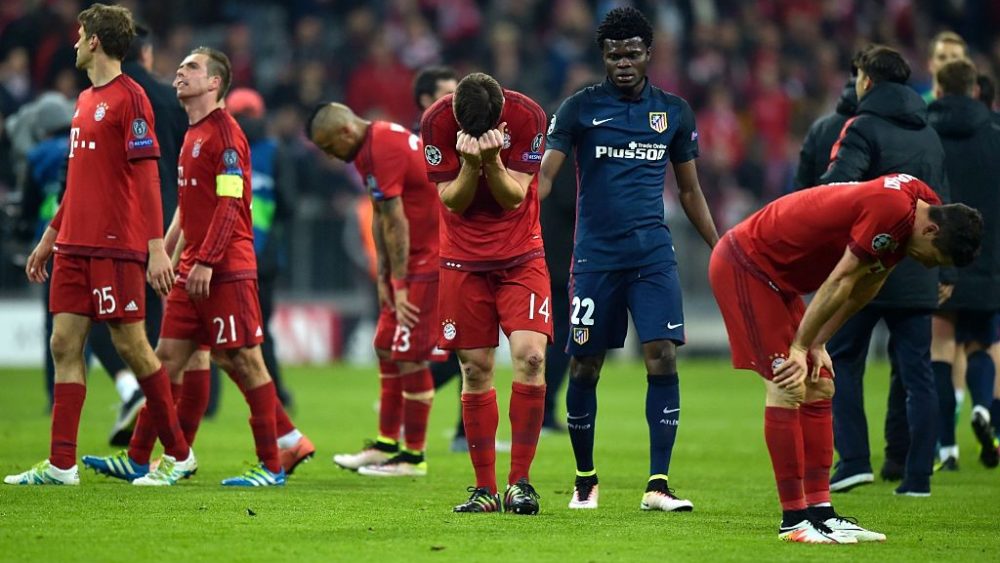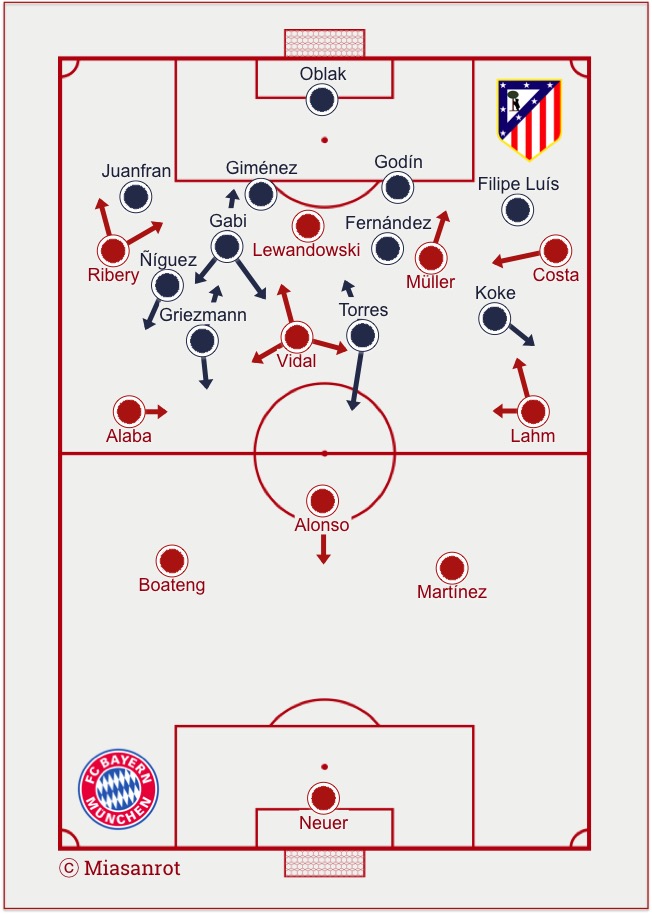Game of my life #13: Guardiola’s last shot
Of course, there was Wembley 2013, the “Finale Dahoam” (the final at home), the numerous clashes with Dortmund, the to and fro against Juve 2016, or the triumphant 4-0 win against Barcelona – there is not the one game that sits squarely above all others.
For my life with football, the new millennium has been a highly intensive time for me. For me personally, it already began in 1999 with Bayern’s devastating loss against Manchester United in the Champions League final. I remember that I wept unashamedly although at the time I was only 6 years old and did not quite understand what had actually happened. Bastian Schweinsteiger and Philipp Lahm, whose careers began in the 2000s, but also Oliver Kahn, Giovane Élber, Bixente Lizarazu and countless others whose careers ended in this period, were an indelible part of my FC Bayern upbringing.
Of course my most intensive time with Bayern has been the last ten years or so. Starting with van Gaal, my favourite club has developed into a side that consistently dominates their domestic league and competes at the highest level internationally. Following the team’s development for me personally was a very unique and intensive experience, which I have also described in my book.
But to me it is not only my emotional involvement that separate Bayern’s second decade from the first one. Above all, it was the strategically farsighted and sportingly impressive development the club made between 2009 and 2016 that was a decisive feature of the new FC Bayern for me. On 3 May, 2016, I had the chance to witness the aesthetic peak of the quite unique kind of football that had come to be played at Bayern at the time with the original Miasanrot crew of Steffen, Felix, Jan, Jolle, Chris and Tobi as well as Dennis, who together with me crashed the party.
The situation before the match
The atmosphere was tense. Guardiola had already announced that he would step down as Bayern coach at the end of the season. In Germany, his qualities as a coach were a matter of lively debate, because after more than two years in charge at Bayern he had not yet delivered the ultimate trophy, a Champions League title. In 2014, his team went out against Real in the semi-finals for a variety of reasons. Summed up simply one could say: “They weren’t ready yet.” In the semi-finals of the following year, the team was only partially able to deliver a competitive performance against Barcelona because the squad was ridden with injuries. And now there was the third attempt in a semi-final. This time against Atlético Madrid.
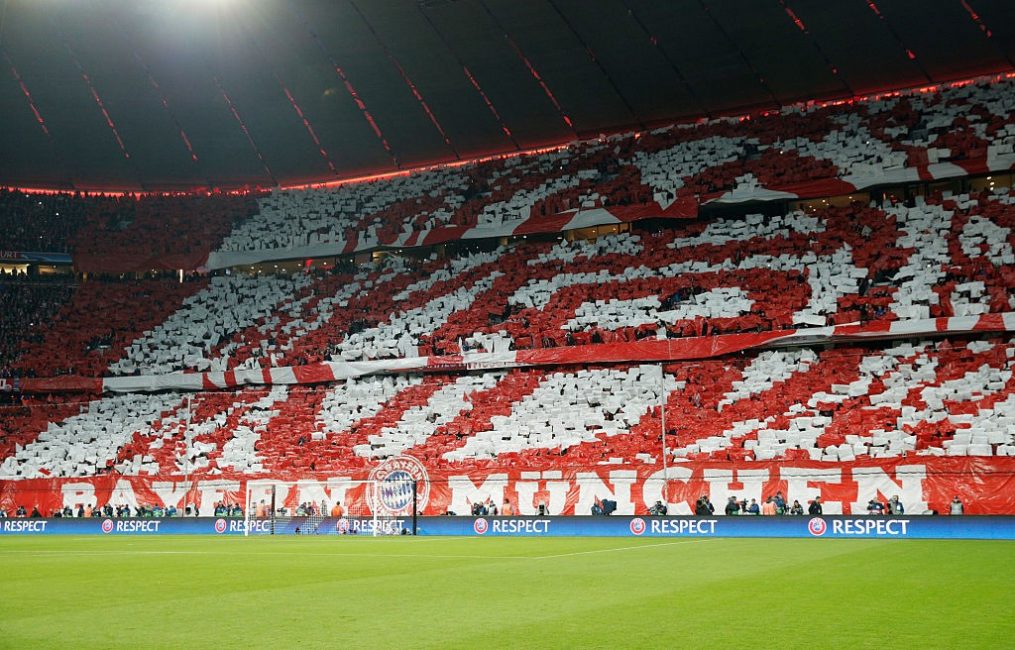
(Image: Adam Pretty/Bongarts/Getty Images)
On their way there, they eliminated Juventus Turin in a dramatic contest in the round of sixteen. Having drawn the home leg 2-2 and being already down 2-0 in the away leg against a tremendous Juve side for the first 60 minutes, they managed to draw level 2-2 thanks to goals by Lewandowski and one in stoppage time by Thomas Müller. This put them into extra time, where two more goals by Thiago and Coman secured the win. In the quarter-finals, the five-time Champions League winners beat Benfica but went on to lose the first leg of the semi-finals against Atlético Madrid 1-0.
It was actually a good performance by Bayern. For half an hour, they seemed a bit lethargic due to difficult pitch conditions and a lack of focus. Atlético knew how to punish this by a goal after an outstanding run by Saúl. In the following, Bayern failed to score an important away goal, although with 15 to 5 attempts they had the clear preponderance of chances. After the match, Guardiola had to face difficult questions: Why did Franck Ribéry and Thomas Müller not play? How could the team lack their concentration so much in the early stages? Why did the pressure in the final phase not come earlier?
Guardiola had only one answer: “You killed me. Everybody killed me, but I’m not dead yet. We still have one more game, I still have one more shot.” And this shot led to the best football game I had ever seen FC Bayern München play.
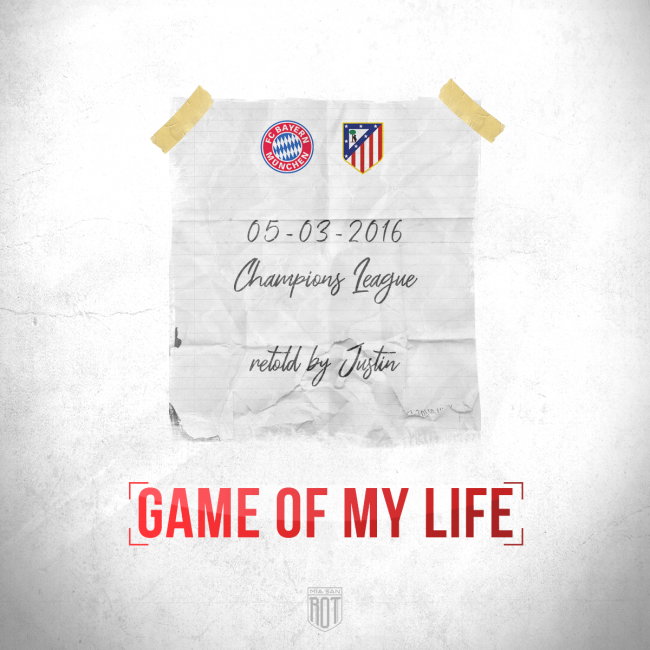
In case you missed it
Guardiola made a few changes from the first leg and brought Müller, Ribéry and Boateng for Thiago, Coman and Bernat. The basic formation – a 4-3-3 on paper – was executed extremely offensively in practice, but more on that in a moment.
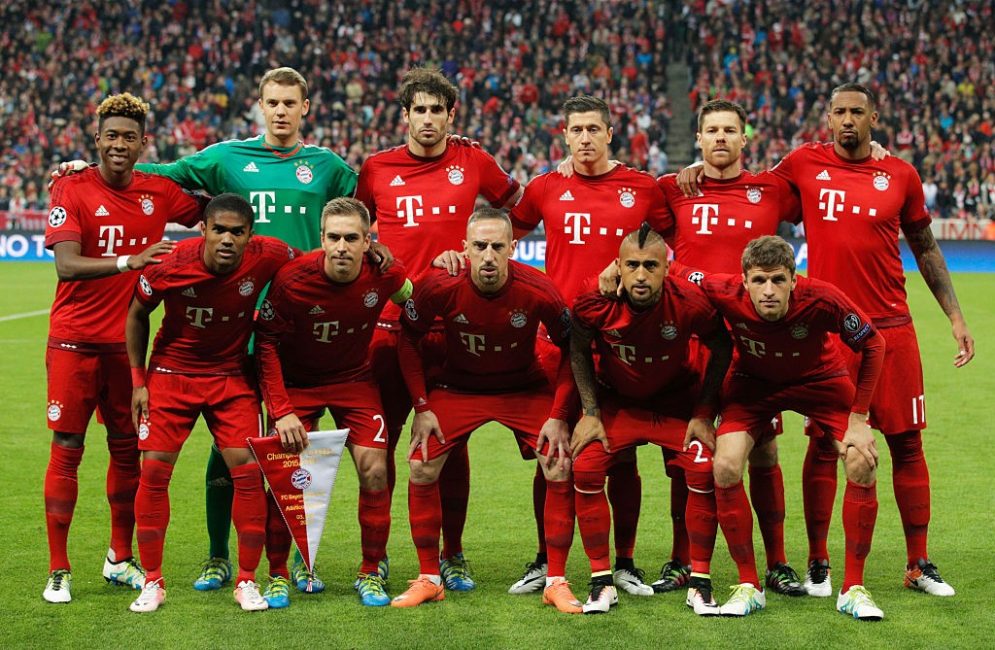
(Image: Adam Pretty/Bongarts/Getty Images)
Diego Simeone, on the other hand, relied on his traditional and extremely successful 4-4-2. No team in the world could defend as well as the Rojiblanco. Needless to say that the challenge of a comeback was not going to be a walk in the park for Guardiola and Bayern.
The first half
But they began furiously. When Bayern had the ball, Vidal, Müller and the two full-backs pushed up so high that in some cases only Boateng and Martínez stayed behind to provide a semblance of defense. Alonso often dropped between these two in Bayern’s build-up play, but when the ball was in higher areas, the on-pitch distribution of the players looked something like a 2-1-7 with neatly staggered positionings of the seven offensive players. Against the ball, Bayern acted extremely high and aggressive in a 4-1-4-1 formation. The pressure caused even a team as seasoned as Atlético to turn over many balls, and so there were hardly any moments of respite for the team from Spain. The two number eights Müller and Vidal, in particular, kept pushing upfield and, together with the wingers, closed the passing lanes to Atlético’s four-man midfield consisting of Koke, Gabi, Fernandez, Saul.
Bayern thus prevented Atlético from putting on pressure early on and they in fact never got the chance to press Bayern high up at any point of the game. Griezmann and Torres were never able to interfere with Bayern’s build-up play. Bayern quickly managed to create several good chances, but the end product was always missing. After half an hour, Vidal (14′, 18′), Müller (17′), Lewandowski (21′, 24′, 25′) and Lahm (28′) already had a number of smaller and bigger chances to bring their team in front, while we of the Miasanrot crew were almost trying to scream the ball into the back of the net.
It was with a few very small exceptions a game on one goal. Then the 31st minute of play came: a free kick for Bayern. Xabi Alonso stepped up, the man for the big games. Up to this point, the Spaniard had offered a textbook example of how one ought to play the role of a deep-lying playmaker. A feast for the eyes, just the way the Guardiola fanboys of the editorial team always like it. And so did I.
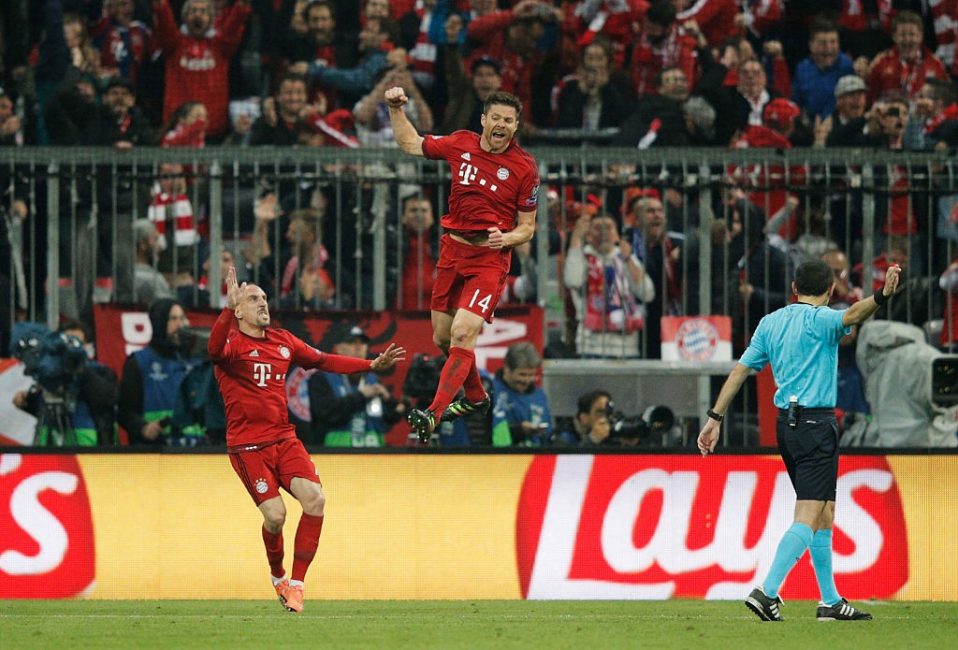
(Bild: Adam Pretty/Bongarts/Getty Images)
Anyway, back to what was unfolding on the pitch: The Real Madrid Bayern legend took the free kick and via a deflection the ball went in. 0-1 Bayern. Atlético now seemed more vulnerable than they had been for a long time and Bayern’s pressure continued to rise even more. Just three minutes later, Bayern were awarded a penalty. Somewhere in an apartment in Berlin, the Miasanrot crew erupted in collective cheers. But before any neighbors could have a reason to complain, Thomas Müller missed the penalty and we were silent again.
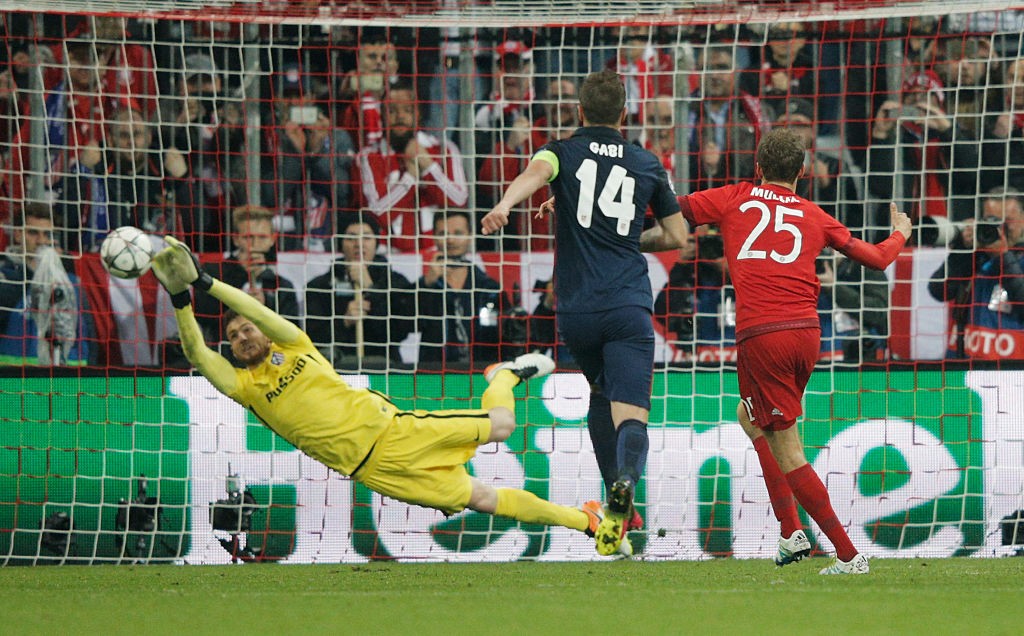
(Image: Adam Pretty/Bongarts/Getty Images)
A breaking point? Not quite, because Bayern remained clearly in control of the game, while only perennial naysayers Tobi and I agreed that things now were going to go downhill fast. But it was only with difficulty that Atlético managed to get to half time with only one goal down. Simeone said after the match: “In the first half, we played against the best team I have ever faced in my career. The way Bayern played was incredible.”
The second half
But Simeone is an old fox. Of course he reacted at half-time. Carrasco came on for Fernández – an attacker for a midfielder, a positive change. Atlético now played in a 4-1-4-1 formation, with Saúl moving into defensive midfield. He was now tasked with man marking Müller (and less frequently Vidal), who had had a lot of space to move between the lines in the first half, allowing Godín and Giménez to concentrate more on Lewandowski in defense.
In retrospect, this small adjustment might have made all the difference. At first, Bayern needed a few minutes to adapt to the switch and fully restore their link-up play on the pitch. Although they were still clearly in control of the game, their gegenpressing lacked the high degree of coordination it still had had in the first half. And so it seemed only fitting that it was a mistake in their gegenpressing that lead to the equalizer for the visitors: Bayern lost the ball and it came to Torres, who was immediately closed down by three Bayern players at once. One of them was Boateng, whose movement opened the way for Griezmann, who received the ball in a free position in front of Neuer and had no difficulties putting it over the line (53′). Silence at the makeshift Miasanrot editorial office. Only one person was busy attacking pieces of furniture in front of him in a highly aggressive pressing.
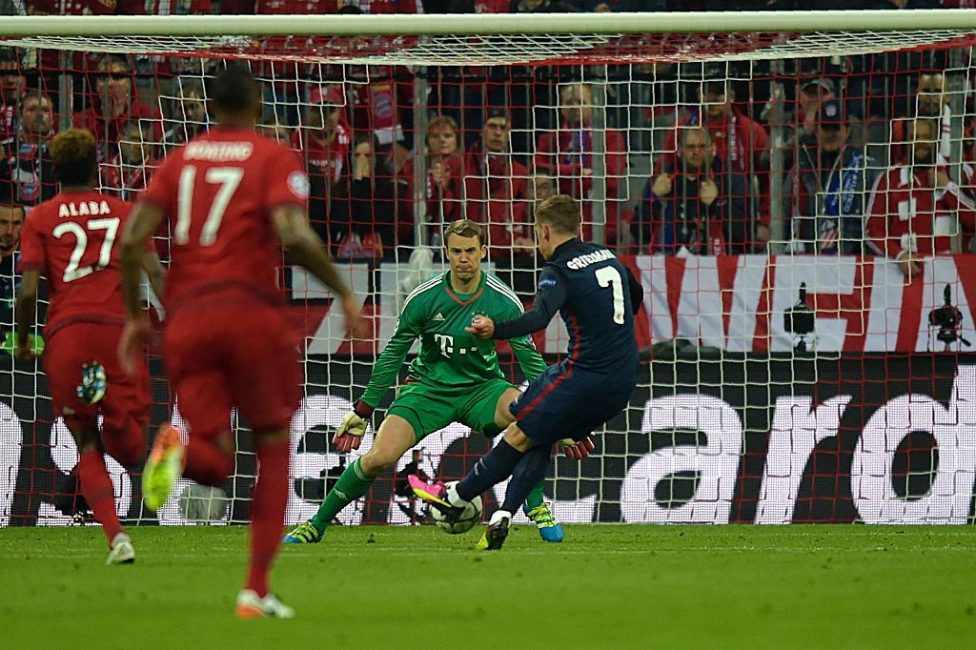
(Image: GUENTER SCHIFFMANN/AFP via Getty Images)
Guardiola, unlike us, reacted immediately and changed the roles of his full-backs. Lahm, who had previously practically been glued to his right sideline and played fairly high up the pitch, now shifted further inside to assist Alonso in providing cover and increasing the chances of winning second balls. Guardiola’s plan B provided for an extremely strong wing focus and overlaps, for which Alaba moved so high upfield that he was partly higher than Ribéry.
Once again, Atlético came under pressure. Bayern put in 16 crosses in the last half hour alone, but this time not for a paucity of other options, but with a system: They crowded the penalty area to make the numbers count: Vidal and Müller supported Lewandowski inside the penalty area, while Alaba, Alonso and Lahm hovered around the edge of the penalty area to attack second balls. Atlético were completely hemmed in and were barely able to free themselves intermittently.
Simeone’s team still had two more shots on goal, both towards the end, when Bayern had to take more and more risks. Bayern, on the other hand, managed to create 14 chances in the final phase alone. One of these came in the 74th minute. Alaba delivered a cross, Vidal laid the ball off for Lewandowski. I jumped up uncontrollably and started to scream out in elation because I was sure that a goal by Lewandowski was imminent. Only when I looked at Tobi and he shook his head in disbelief at the commotion I had caused, I came to my senses again.
Not only we of the Miasanrot crew were at boiling point, the arena was too. Bayern kept on attacking relentlessly, but suddenly, Atlético was awarded a penalty. The right decision would have been a free kick. I will spare you a detailed description of what happened at our Berlin apartment when the replay was shown, which showed the referee to have made the wrong decision, and fast forward straight to the parade of Manuel Neuer, who kept our hopes alive.
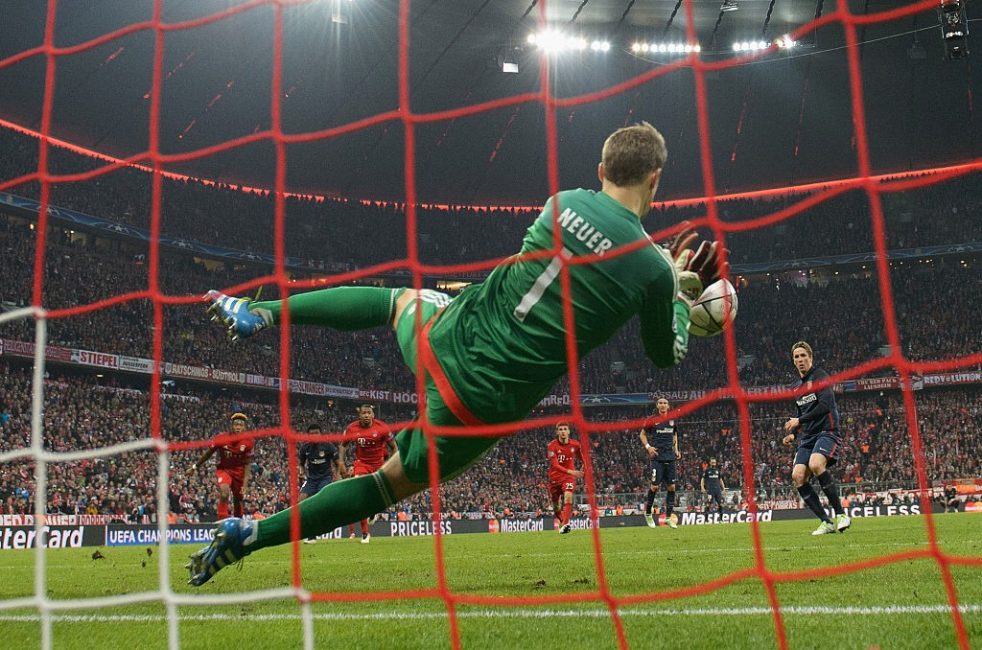
(Image: Matthias Hangst/Bongarts/Getty Images)
But the knockout punch failed to appear. Guardiola remained unfinished. Above all, Bayern’s players were not rewarded for an outstanding performance against the best defensive team in the world. 3.39 to 1.41 Expected Goals (each including a penalty kick) and 33 to 7 shots. Never has a saying been more apt: It just wa not meant to be. I sat on the couch completely empty and looked at Chris and Jolle half baffled, half admiringly, as they already began to analyze the game. Afterwards my mind was caught in between a state of pride in the great performance and annoyance that even that did not prove to be enough.
Things that caught our eye
1. Bayern at the peak of their creativity
There are several reasons why in my view Bayern reached the pinnacle of their footballing craft on this evening: Firstly, there’s the level of the opponent. Atlético was not just any old team. No team in Europe defended as flexibly, stably, aggressively and disciplined as they used to do back then. That makes it all the more impressive for Bayern to have been able to clearly be in the driving seat over two games. In the end it was 53 to 18 attempts in favor of Bayern. Various expected goals models also see Bayern ahead by around three expected goals. Against Atlético, this is an outstanding value.
Second, the level of flexibility, including the capacity of the players to bounce back mentally. Several setbacks (a missed penalty, a tactical switch by the opponent, a resulting brief loss of control, a goal conceded, and a penalty kick caused) were followed by major phases of Bayern pressure – not only on the furniture in the aforementioned Berlin apartment, but also on the pitch. An important factor for this was certainly Pep Guardiola, who was able to considerably influence the game from the outside. But the players were also at the height of their mental faculties. On reviewing the match, one could almost think that not only I, but also the Bayern players had already seen every situation once before – with the exception of the short blackout in the 53rd minute.
The third reason goes back to a statement once made by Thomas Tuchel. While he was head coach at Dortmund, he once described Bayern as an unforgiving machine that would begin to take apart its opponent as soon as they set foot outside their own penalty area. Although Guardiola’s Bayern did not have the same aesthetic appeal as Guardiola’s Barcelona, it nevertheless represented an unprecedented period of dominance in the context of Bayern’s history. On that evening, it reached its peak. Gegenpressing, aggressiveness, but also precision in possession. Guardiola did not even need a technically outstanding midfielder for this, but “only” Xabi Alonso, who controlled and directed the game almost single-handedly. In offense, Müller and Vidal were rather different types of players, but on this evening they were a perfect match for the coach’s strategy.
2. Everything we criticize as missing today – the game had it in its perfection
Revisiting the game today has a very revelatory element to it. Because at times the playing style back then was as banal as it is today: open up space someone on the wings, cross, shot on goal or gegenpressing to win the second ball. Only in 2016 this banality was adorned with so many little embellishments that as a holistic performance, it was very different from today.
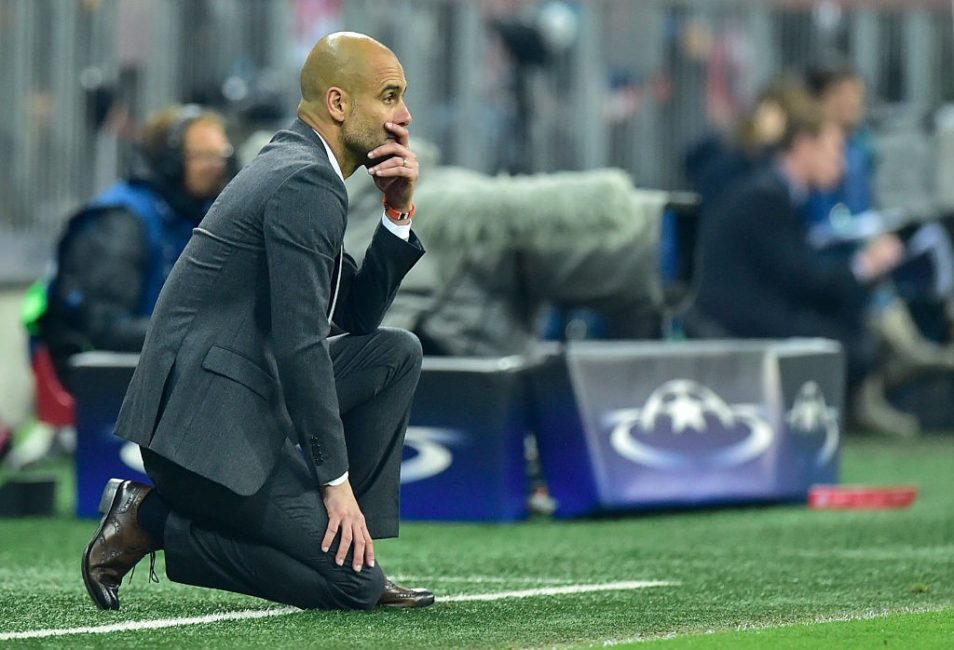
(Image: JOHN MACDOUGALL/AFP via Getty Images)
It seemed that there was a purpose to each movement that followed a greater goal. Lewandowski was also supported by two accomplished headers of the ball in the center: Müller and Vidal. So the crosses themselves were only a means of getting the ball into the penalty area quickly. Should it be cleared there, there was enough backward protection with Lahm, Alaba, Alonso and sometimes even an advancing central defender.
The strong wing focus was not such a big problem because the players always found diagonal passing lanes from the outside to the center, which in turn opened up space for the wide players to attack. But what was particularly crucial was that, although Vidal and Müller were not the best midfielders in terms of the qualities of their positional play one could imagine, Bayern always managed to get into the spaces between the lines. Alongside Xabi Alonso, Jérôme Boateng deserves special mention. Both were outstanding quarterbacks. Alonso initially supported the two center-backs in creating overloads against Torres and Griezmann, and later did the same against Torres, Griezmann and Carrasco higher up the pitch. Either he created room for Boateng with his movements for him to play the long balls up front, or it was Alonso himself who played long passes when he had the space.
Guardiola could afford to have a lot of players in the final third because he had these great quarterbacks. That evening, Bayern proved that a short passing game is not the only way to success, but that more mundane means can be equally successful if they are orchestrated in a sophisticated fashion.
3. Robben was missing
With Robben on the pitch, Bayern might have won the game. In spite of all their class, they desperately lacked another clinical striker in attack. Ribéry and Costa were not, even Lewandowski needed many chances to score and Müller seemed to show first signs of a creative crisis at that time, this perhaps being a consequence of his no longer being an undisputed first team regular under Guardiola. But Robben’s presence and quality in big games would have guaranteed the decisive goal. I’m sure of it.
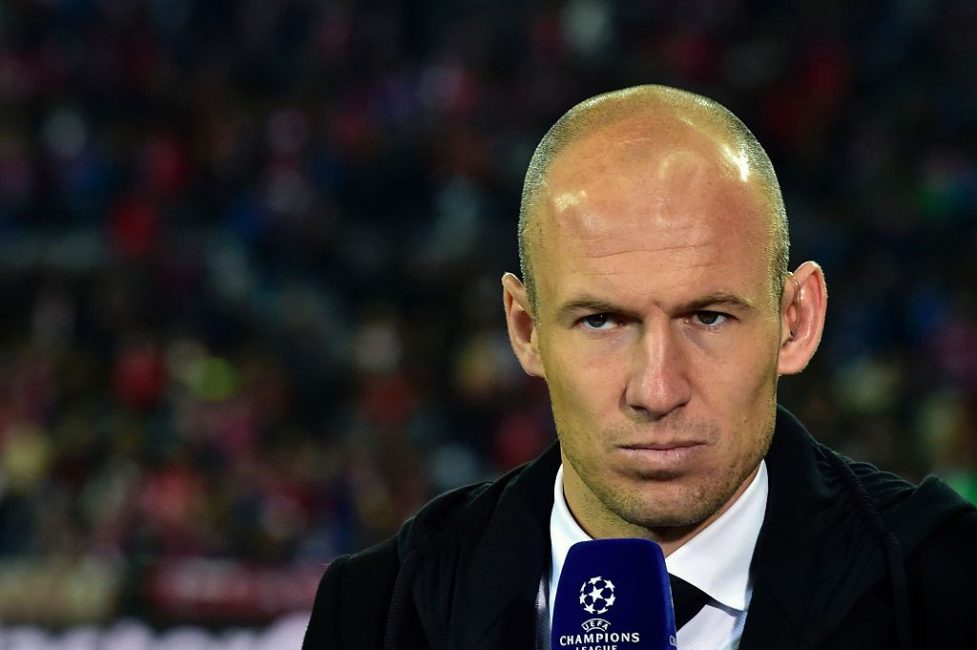
(Image: JOHN MACDOUGALL/AFP via Getty Images)
4. Jan Oblak makes the difference
Quite what an outstanding goalkeeper Jan Oblak is, he proved in this match. His presence and his saves brought Atlético to the finals. Chapeau!
What the game meant
This game is a prime example of the fact that a great performance alone is not always enough. It had not been the first time that Bayern had this experience. Manchester 1999, Chelsea 2012 – if they fail to seize their chances, they always run the risk of an unexpected defeat. Hence, all the statistics are of little value if, in the end, Atlético has scored one more away goal. Here it must be allowed to criticize Guardiola despite his great successes during his time at Bayern. In the Champions League especially, his sides have rarely been able to achieve a respectable result away from home. But against Atlético, they came very close to doing so in the first leg. For about 60 minutes, a dominant and powerful Bayern side clearly were the better team. Yet what exactly the reasons for the first 30 minutes were will forever remain unknown.
There is no such thing as complete superiority in a football match anyway. Griezmann and Atlético proved that in Munich when they took advantage of a brief moment of lack of organisation among their opponents. Unfortunately, Bayern under Guardiola too often missed the ultimate degree of ruthlessnes and being clinical. Sometimes a little bit of luck at the right time weighs more than your own strategy, as good as it may be.
But this is also why the Champions League is such a complicated competition. Year after year, the question of who wins hangs by a thread of countless coincidences. There is not one strategy that guarantees the title. But there are many strategies that, when adapted to your own squad, can improve your own chances. Guardiola may have failed, but you cannot fault him for not having adapted his philosophy to his players in the 2015/16 season to maximize his chances.
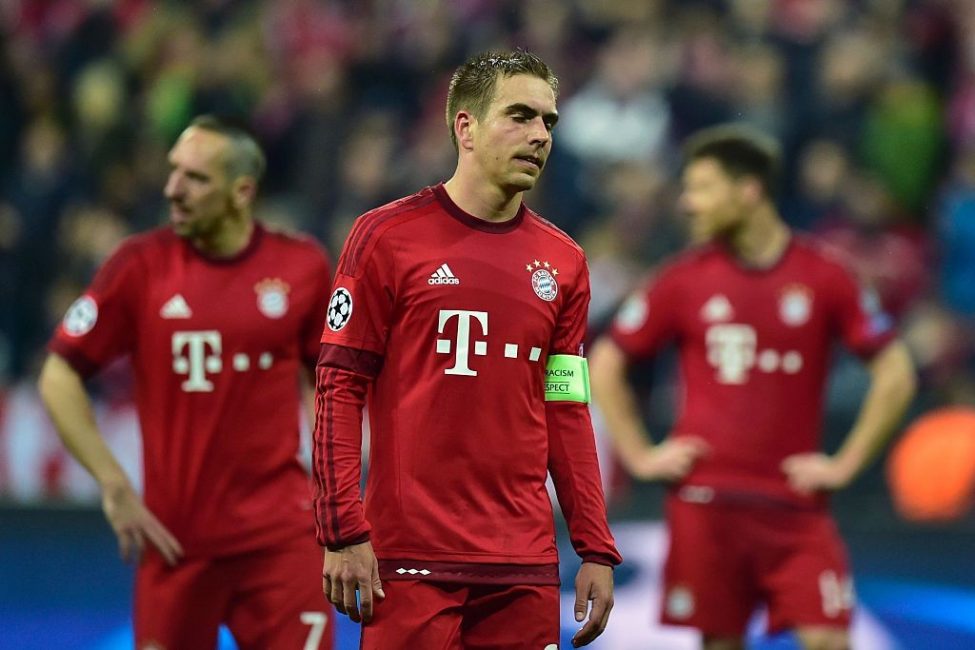
(Image: JOHN MACDOUGALL/AFP via Getty Images)
But even if the chances weigh heavily in your direction, it is sometimes is not enough. All in all, I will keep fond memories of this football festival in the second leg of the semi-finals. It was not only Guardiola’s last shot, but also FC Bayern’s last for many a year. Until this day, Bayern never again came that close to the final – not even in 2018 under Jupp Heynckes, when they were the slightly better side than Real Madrid, but ultimately made far more mistakes than in 2016. I am still convinced that the best team in Europe back then lost to Atlético in the semi-finals. One can only be proud of such a performance by the team you support. And this pride even carried over to the Miasanrot comment section right after the final whistle.
While Chris and Jolle were tinkering with the match report, Felix, Jan, Tobi, Dennis and I listened to Steffen telling us about tales of days gone by. I was proud. The game of my life felt like a defeat – and yet like a great achievement. Because that is what it was: A great game and the most impressive performance I have ever seen from a Bayern team. Unfortunately without the corresponding reward. But at least for me it was the beginning of my own era at Miasanrot and several great new friendships.



